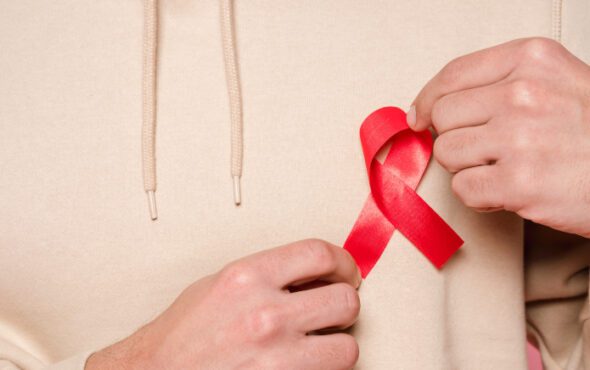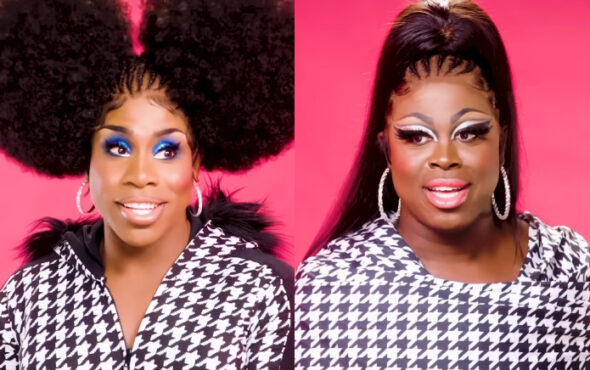
Those living with HIV have taken to social media to share examples of the discrimination they’ve faced because of their status ahead of a march, vigil and rally being held in London to challenge stigma.
The experiences were shared in response to a tweet from Terrence Higgins Trust, the UK’s leading HIV and sexual health charity, which asked HIV-positive people to share an “example of HIV-related stigma you’ve faced.”
“I was told I was not eligible for income protection insurance because of my health status (despite never taking any extended periods of sick leave in my entire life),” said actor, playwright and activist Nathaniel Hall.
Andrew Bates, an occupational therapist living in London, wrote that he was asked if he had been “naughty” after sharing his HIV status during a GP appointment.
“#FightHIVStigma and the rhetoric that because you are living with HIV, you have done something wrong,” he continued.
READ MORE: 5 leading politicians on ending new HIV transmissions in England by 2030
Before receiving their COVID-19 vaccination, Ana de Oliveira explained that they were asked if they had any health conditions.
When they replied that they have HIV, the nurse questioned this and told Ana they didn’t “look sick”.
Ian Green OBE, the former CEO of Terrence Higgins Trust, said he has “so many examples” – particularly in a healthcare setting.
Two that he shared include a “dentist wearing a hazmat suit” and “having high risk stamped on phlebotomy forms”.
Cllr Daniel Laycock shared his experiences of facing stigma on gay dating app Grindr, such as being told he should die.
“I’d never sleep with someone who has that,” another user said to him.
If you're living with HIV, quote tweet this with an example of HIV-related stigma you've faced.
It's because of the shocking prevalence of HIV-related stigma & discrimination that we're taking to the streets to #FightHIVStigma this Saturday. Join us: https://t.co/Bv9BRPlFEz pic.twitter.com/vOAAxXZX84
— Terrence Higgins Trust (@THTorguk) March 13, 2023
Richard Angell, Chief Executive of Terrence Higgins Trust, said: “It’s shocking to hear so many examples of the stigma and discrimination faced by people living with HIV. But it’s also why we’re hosting a day of action to fight this stigma and raise awareness of all the progress made in preventing, testing for and treating HIV. Including the goal that’s firmly in our sights of ending new HIV cases by 2030.
“HIV stigma may have changed since the 1980s, but it’s definitely still there. It’s in healthcare, it’s on dating apps and it’s in too many workplaces. We hope that all of these stories of HIV stigma motivate people to join our march this Saturday and stick with us as we do everything we can to transform public perceptions of HIV – because we can’t do it alone.”
A march, vigil and rally challenging HIV stigma will be held in London on 18 March
More than two dozen HIV organisations and charities will soon hold a march, vigil and rally in order to fight stigma.
Set to take place in London on Saturday 18 March, people will begin gathering at Forum Magnum Square, 1A Belvedere Road, SE1 7GB from 12pm.
The march will begin at 1pm sharp and will go across Westminster Bridge, past Downing Street and finish at Trafalgar Square.
READ MORE: More than 20 HIV organisations partner to hold march, vigil and rally against stigma
In Trafalgar Square there will be a short vigil and rally, which is expected to be completed by 3pm.
The event will be an inclusive space that is open to people living with HIV, as well as allies to those who are.
Those wishing to attend are advised not to bring candles to the vigil as these are not allowed in Trafalgar Square.
The UK has one of the biggest decreases in new HIV diagnoses worldwide
According to the most recent estimates, 106,890 people were believed to be living with HIV in the UK in 2019 – 5,150 of which are believed to be undiagnosed.
However, new diagnoses have been declining since their peak in 2005, with the government sharing its plan to reach zero new cases by 2030 on World AIDS Day in 2021.
The UK has one of the biggest decreases in new HIV diagnoses worldwide, with the government reporting a 35% reduction in new diagnoses in England between 2014 and 2019.
READ MORE: HIV test that shows result in 15 minutes made freely available in England
More than half of women living with the virus in the UK have experienced violence because of their HIV status, according to Terrence Higgins Trust.
Just three in 10 members of the British public say they would feel comfortable going on a date with someone who is HIV-positive, with the vast majority saying that they would not have sexual intercourse with someone who is on effective treatment.



